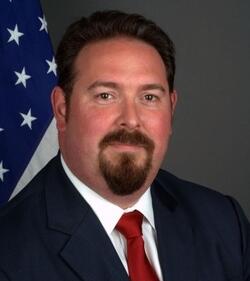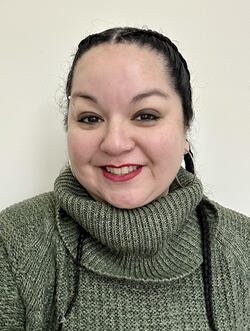Working Group Members
Co-Chairs:
 Austin Choi-Fitzpatrick
Austin Choi-Fitzpatrick
Professor of Sociology, Kroc School of Peace Studies, University of San Diego
Director, Social Innovation MA Program, University of San Diego
Austin works across a range of disciplines to explore the impact of technology, politics and culture have on social change. An early round of work focused on the anti-trafficking movement (From Human Trafficking to Human Rights (ed), Penn, 2013) social movement targets (What Slaveholders Think, Columbia, 2017), social movement technologies (The Good Drone, MIT Press, 2020), ethical dilemmas in peace and justice work (Wicked Problems (ed), Oxford, 2022), and the complexity of human rights narratives (Bonded, under review).
Austin’s current projects are focused on the role creativity and collaboration play in social change. In particular, he is interested in how people work together to imagine and create for an uncertain future. In this vein he is the Program Director in the Master of Arts in Social Innovation at the Kroc School, a “Free Radical Fellow” at the Aspen Institute’s Global Leadership Network, a founding member of the Art Builds Artist Collective, and Co-Chair of the GLC Working Group on Future of Slavery and Emancipation at Yale University.
Anna Mae Duane
Professor of English, University of Connecticut
Director, Humanities Institute, University of Connecticut
Anna Mae Duane is Professor of English and American Studies at the University of Connecticut, and Director of the UConn Humanities Institute. She teaches and writes in the fields of American Studies, African American Literature, and the Medical Humanities. She’s particularly interested in how definitions of youth and childhood shape culture and policy in ways that require the abdication of rights in order to claim care. She is the author or editor of six books including Educated for Freedom: The Incredible Story of Two Fugitive Schoolboys who Grew Up to Change a Nation; Child Slavery Before and After Emancipation: An Argument for Child-Centered Slavery Studies and Who Writes for Black Children?: African American Children’s Literature before 1900. Her public-facing scholarship includes publications in Salon.com, Slate.com and an ongoing podcast.
Members:
 Amb. (ret.) Luis C.deBaca
Amb. (ret.) Luis C.deBaca
Professor from Practice, University of Michigan Law School
Ambassador (ret.) Luis C.deBaca, ‘93, led U.S. government activities in the global fight against contemporary forms of slavery during the Obama administration. As Ambassador at Large to Monitor and Combat Trafficking in Persons, C.deBaca updated statutes created after the Civil War and through the 13th Amendment to develop the victim-centered approach to modern slavery that has become the global standard for combating human trafficking. In the Civil Rights Division of the Department of Justice (DOJ), C.deBaca investigated and prosecuted complex criminal cases, negotiated labor and human rights advances, and managed multi-million dollar grant portfolios combating slavery and sexual abuse. As one of the most decorated federal prosecutors in the U.S., he investigated and prosecuted cases of human trafficking, hate crimes, and police misconduct, as well as immigration, organized crime, and money laundering. He built his litigation record into policy, incorporating the voices of victims, workers, and the advocacy community into decision making. As principal DOJ drafter of the U.S. Trafficking Victims Protection Act and a member of the team that negotiated the United Nations’ anti-trafficking protocol, he helped to enshrine the “3P” anti-trafficking approach of prevention, protection, and prosecution in U.S. and international practice. Following his prosecution career, he served as Counsel to the House Committee on the Judiciary, where he handled issues of civil rights, immigration, and civil liberties, including revisions to the Foreign Intelligence Surveillance Act. In the Obama Administration, he served as Director of the State Department’s Office to Monitor and Combat Trafficking in Persons from 2009 to 2014 and as the Director of the Justice Department’s Office for Sex Offender Monitoring Apprehending, Registering, and Tracking from 2015 to 2017. After retiring from government service, C.deBaca was a Senior Fellow of Modern Slavery at Yale University’s Gilder Lehrman Center for the Study of Slavery, Resistance, and Abolition, and served as a Lecturer in Law at Yale Law School and Lecturer of Architecture at Yale School of Architecture. He also was a 2017-2019 Soros Open Society Human Rights Fellow focusing on worker-led social responsibility, and is a member of the Council on Foreign Relations. C.deBaca’s teaching and research interests include Criminal Law, Race & Slavery, Policing, Immigration, National Security, Labor, Indian Law, International Law, and Civil Rights. Current projects include an inquiry into the imprint of current and historical forms of slavery and involuntary servitude on the built environment, re-thinking business practices that incentivize the use of forced labor, and preparatory work toward a national slavery memorial in Washington, D.C.
Cara Daggett
Assistant Professor, Political Science, Virginia Tech
Cara Daggett is Assistant Professor of Political Science at Virginia Tech. She researches the politics of energy and the environment, feminist studies of science and technology, and histories of empire. Her book, The Birth of Energy: Fossil Fuels, Thermodynamics, and the Politics of Work (Duke, 2019), was awarded the Clay Morgan Award for best book in environmental political theory and the Yale H. Ferguson Book Award from the International Association Northeast and has been translated into multiple languages. Her work has been published in journals including Environmental Politics, Energy Research & Social Science, Millennium: Journal of International Studies and the International Feminist Journal of Politics. She has also enjoyed public-facing writing, podcasting, and engagements with artists and architects around questions of energy - especially how human activities are organized and valued.
 May Farid
May Farid
Assistant Professor of Political Science, Kroc School, University of San Diego
Dr. May Farid is Assistant Professor of Political Science at the Joan B. Kroc School of Peace Studies, University of San Diego. She studies the interaction between citizen groups and states, with a focus on policy influence under authoritarianism and, more recently, transnational advocacy. Her research explores how citizen groups shape state policies in a variety of contexts: grassroots NGO and INGO advocacy in China, cross-sector knowledge communities and local policy, and INGOs promoting global environmental governance in China’s outbound aid and investment. Another branch of her research studies NGO interventions to empower citizens in the global South, through programs that fight misinformation or promote social cohesion in India. Her work has been published in International Affairs, World Development, Studies in Comparative International Development, Voluntas, and the Journal of Chinese Political Science. Before joining the Kroc School, Dr. Farid conducted research as a visiting scholar at the Stanford Center on China’s Economy and Institutions and taught at the University of Hong Kong. She holds a DPhil in Politics from the University of Oxford. Outside academia, Dr. Farid ran an institutional capacity building program for rural grassroots NGOs in China for seven years, and conducted a four-year research project on development in ethnic minority regions for China’s leading government policy think-tank.
Talitha LeFlouria
Associate Professor of History and Fellow of the Mastin Gentry White Professorship in Southern History, University of Texas- Austin
Talitha L. LeFlouria earned her Ph.D. in US History at Howard University and has held positions with the Frederick Douglass National Historic Site (National Park Service) and the Moorland-Spingarn Research Center in Washington, DC. Before joining the History department at The University of Texas at Austin, she worked as an Assistant Professor of History at Florida Atlantic University and as the Lisa Smith Discovery Associate Professor of African and African-American Studies at the University of Virginia. She is the author of Chained in Silence: Black Women and Convict Labor in the New South (UNC, 2015), the first history of Black, working-class incarcerated women in the post-Civil War period. This book received several awards including: the Darlene Clark Hine Award from the Organization of American Historians (2016), the Philip Taft Labor History Award from the Cornell University School of Industrial and Labor Relations & Labor and Working-Class History Association (2016), the Malcolm Bell, Jr. and Muriel Barrow Bell Award from the Georgia Historical Society (2016), the Best First Book Prize from the Berkshire Conference on the History of Women, Genders, and Sexualities (2015), the Letitia Woods Brown Memorial Book Prize from the Association of Black Women Historians (2015), and the Ida B. Wells Tribute Award from the Charles H. Wright Museum of African American History (2015). She is currently finishing her second single-authored book, “Searching for Jane Crow: Black Women and Mass Incarceration in America from the Auction Block to the Cell Block” (forthcoming from Beacon Press). The Carnegie Corporation supported this project with a prestigious Andrew Carnegie fellowship. In addition to her scholarly publications, LeFlouria writes for popular media outlets, including The Atlantic, The Washington Post, and The Root. Her research has also been profiled in Ms. Magazine, New York Magazine, Huffington Post, The Nation, and in several PBS documentaries including Slavery by Another Name.
 Katrin Kinzelbach
Katrin Kinzelbach
Professor of International Politics of Human Rights, Institute of Political Science, Friedrich-Alexander-Universität (FAU) Erlangen-Nürnberg
 Scott Moore
Scott Moore
Practice Professor in Political Science
Originally from Louisville, Kentucky, Scott Moore is a political scientist, university administrator, and former policymaker whose career focuses on China, sustainability, and emerging technology. As Director of China Programs and Strategic Initiatives at the University of Pennsylvania, Scott Moore works with faculty members from across the University to design, implement, and highlight innovative, high-impact global research initiatives in areas including sustainability and emerging technology.
Dr. Moore directs Penn Global’s four research and engagement fund programs, including those designed to support faculty-led projects in China, India, and Africa as well as its At-Risk Scholars Program. In addition, Dr. Moore conducts research as an affiliate of the Center for the Study of Contemporary China and The Water Center at Penn, and teaches in the Department of Political Science. His first book, Subnational Hydropolitics: Conflict, Cooperation, and Institution-Building in Shared River Basins (Oxford University Press, 2018), examines how climate change and other pressures affect the likelihood of conflict over water within countries. His latest, China’s Next Act: How Sustainability and Technology are Reshaping China’s Rise and the World’s Future (Oxford University Press, 2022), explores how shared ecological and technological challenges force us to re-envision China’s rise and its role in the world.
Prior to Penn, Dr. Moore was a Young Professional and Water Resources Management Specialist at the World Bank Group, and Environment, Science, Technology, and Health Officer for China at the U.S. Department of State, where he worked extensively on the Paris Agreement on climate change. Before entering public service, Dr. Moore was Giorgio Ruffolo Post-Doctoral Research Fellow with the Belfer Center for Science and International Affairs at Harvard University. He was also awarded the Council on Foreign Relations International Affairs Fellowship, the National Committee on U.S.-China Relations Public Intellectuals Program fellowship, the Fulbright fellowship, and the Truman Scholarship.
His research and commentary on a wide range of environmental and international affairs issues has appeared in a range of leading scholarly journals and media outlets, including Nature, The China Quarterly, Foreign Affairs, and The New York Times. Dr. Moore holds doctoral and master’s degrees from Oxford University, where he was a Rhodes Scholar, and an undergraduate degree from Princeton.
 Melissa I. M. Torres
Melissa I. M. Torres
Argiro Fellow, Gilder Lehrman Center, Yale University
Dra. Melissa I. M. Torres is the Inaugural Argiro Fellow in the Study of Modern Slavery at the Gilder Lehrman Center for the Study of Slavery, Resistance, and Abolition and Visiting Assistant Professor at the Program in Ethnicity, Race, and Migration at Yale University. She was previously a Global Health Scholar and Assistant Professor at the Baylor College of Medicine Menninger Department of Psychiatry and Behavioral Sciences and Research Lead for the Global Mental Health Division, which is comprised of the Anti-Human Trafficking Program and the Clinic for International Trauma Survivors. She has also served as the Director of the Human Trafficking Research Portfolio and Adjunct Faculty at the University of Texas at Austin School of Social Work. She received her Masters of Social Work and PhD at the University of Houston Graduate College of Social Work where she is Adjunct Faculty, developed the university’s first course on human trafficking, and co-founded the college’s Latin American Initiative. Dr. Torres served as the Subject Matter Expert on the U.S. Department of Health and Human Services’ healthcare professional’s response to human trafficking program, which developed the SOAR program. She served as the Deputy Director for the American Red Cross Latino Engagement Team during its founding year and currently serves as the human trafficking expert for various academic studies and programs in the U.S. and Latin America.